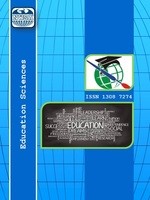POSTMODERN BİR DRAMA UYGULAMASI: MEKANİK KAVRAMLARI KULLANILARAK HAZIRLANMIŞ KAVRAM AĞI
Drama denilince birçok kişinin aklına bir tiyatro oyunu gelebilir. Bu gibi durumlar; tiyatro, oyun, rol oynama, dramatizasyon ve drama gibi kavramların uzun bir zaman birbiri yerine kullanılması sonucunda oluşmuştur. Fen eğitiminde drama, en nadir kullanılan metotlardandır. Bu metodu uygulayacak öğretmen ya bir senaryo yazar ya da anlatacağı fen olayının sınıfta canlandırılmasını sağlar. Modern bir eğitim metodu olarak drama zamanla artan bir fen eğitimcisi grubu tarafından taktir görmekte ve bahsedilen iki biçimiyle kullanıla gelmektedir. Ancak post-modern drama uygulamaları dramanın diğer eğitim çalışmalarıyla etkileşmesi ile kullanılmaktadır. Örnek olarak gösterilen bilgisayar simülasyonlarının rol olarak dağıtılması ve sınıf içinde canlandırılması ve bir testin drama yaparak çözülmesi verilebilir. Bu yaklaşım drama kavramını bir çatı olarak ele alır ve âkendisi dışında başka bir şey olma gayretiâ olarak tanımlar. Bu tanım ve yaklaşımla drama daha geniş bir kullanılabilirlik kazanır. Bu çalışmada ise eğitimde ölçme değerlendirme alanında yaygın olarak kullanılan kavram ağı oluşturma çalışması drama ile bütünleştirilmiştir. Fizik öğretmenliğinde okuyan öğrenciler mekanik konusundaki temel kavramları rol olarak almış ve rollerine uygun ilişkiler tanımlamışlardır. Bu çalışma; ortaya çıkan ağı, bu süreçte yaşanan temel yaklaşımları ve bu post-modern drama yaklaşımının öğretmen adayları tarafından değerlendirilmesi içerir. Tepede kütle, uzunluk ve zaman olacak biçimde kavram ağı oluşturma süreci öğrencilerin üç saat sonraki sınavlarını unutturacak kadar etkili olduğu kayıtlarda tespit edilmiş bulgulardandır. Öğretmen adaylarının kullanılabilir bulması ve kullanacakların belirtmeleri bu uygulamanın önemini bir miktar daha arttırmıştır.
Anahtar Kelimeler:
Drama, Fizik Eğitimi, Kavram Haritaları, Mekanik, Postmodern
A Postmodern Implementation of Drama: The Concept Map Prepared by Using Mechanics Concepts
When drama is the case, most people may think of a play in the theater. As a result of interchangeably use of concepts, such as theater, play, role playing, dramatization, and drama, such a situation takes place. In science education, drama is one of the methods, rarely used. The teacher using this method writes a scenario or has the science concept to be taught played by students. The drama, as a contemporary instructional method, is appreciated by a group of science teachers, and it has been used with its two types of implementations aforementioned. However, the postmodern drama is implemented by integration of drama with other instructional studies. Giving roles to students based on a presented computer simulation and having them played in the class, and taking a test by role playing may be given as examples. This approach takes the concept drama as a basis and defines it as âattempt to be someone or something elseâ. With this definition and approach, drama has got a broader usability. In this study, the study of concept map formation, commonly used in the field of measurement and evaluation in education, is integrated with drama. The students of Physics Education took the fundamental mechanics concepts as roles and identified their roles' relationships with the other concepts. This study includes the concept map formed, the common attitudes during this process, and the evaluation of this postmodern drama implementation by physics teacher candidates. It was observed on the records that the process of concept map formation based primarily on mass, length, and time was quite effective. The significance of this implementation is highlighted by that the physics teacher candidates found it useful and that they said they were going to use it.
Keywords:
Drama Physics Education, , , , ,
- Başlangıç: 2009
- Yayıncı: E-Journal of New World Sciences Academy
Sayıdaki Diğer Makaleler
VİDEO PAYLAŞIM SİTELERİNİN EĞİTSEL AMAÇLI KULLANIMI
Duygu TAŞKIN, Funda AYDIN, Bülent GÜVEN, Elif AKŞAN
ÖĞRETMEN ADAYLARININ ÖĞRENME STİLLERİNİN BAZI DEĞİŞKENLER AÇISINDAN DEĞERLENDİRİLMESİ
Rasit Zengin, Ömer Lütfü Alşahan
BİLGİSAYAR KULLANIMI ÖĞRETİMİNDE AKRAN DEĞERLENDİRME
Mehmet Nuri GÖMLEKSİZ, Ayhan KOÇ
Hatice ODACI, Çiğdem Berber ÇELİK
İLKÖĞRETİM OKULU ÖĞRENCİLERİNİN SOSYAL KULÜP ETKİNLİKLERİ KONUSUNDAKİ GÖRÜŞLERİ (BİTLİS İLİ ÖRNEĞİ)
21. YÜZYILDA ÖĞRETMEN ADAYLARININ BİLGİ OKURYAZARLIK BECERİLERİNİN DEĞERLENDİRİLMESİ
